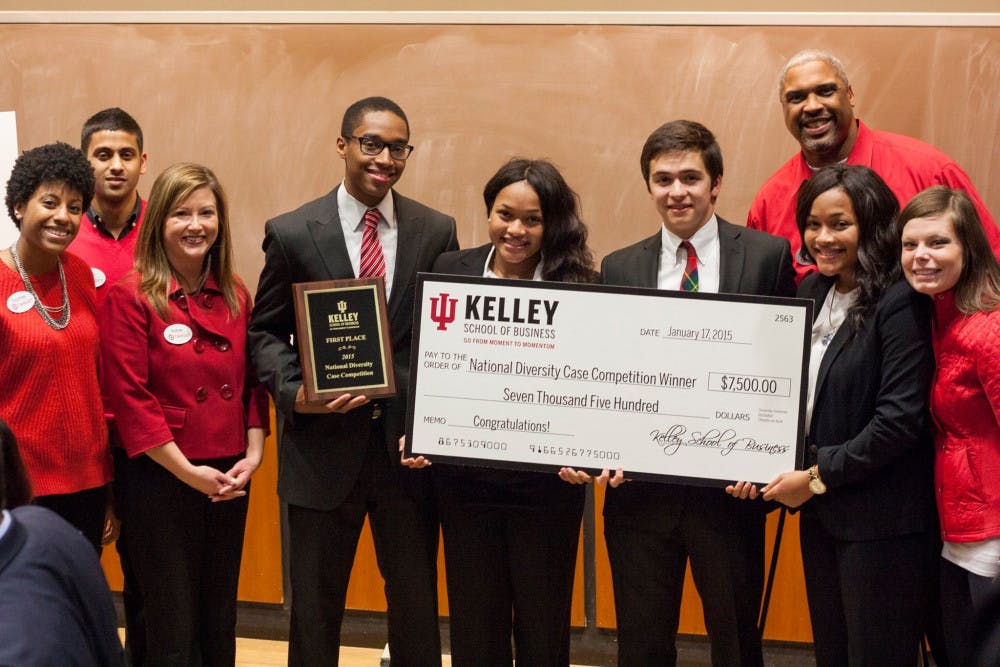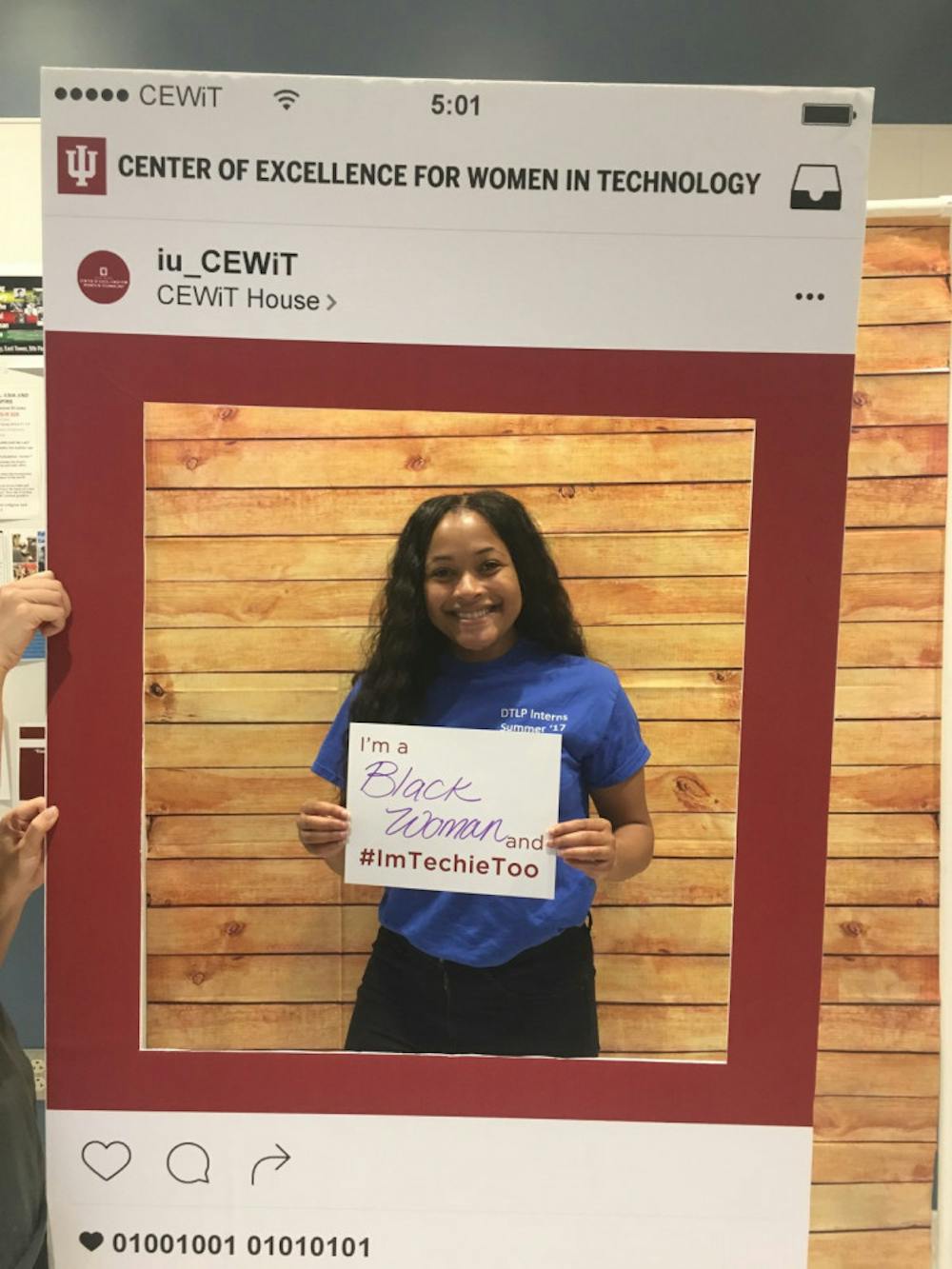I've been fortunate enough to sit down with IU Senior Mica Caine to explore her IU experience for this edition of WIUX's Profiles of Excellence. Here's a little insight into what Mica does, who she is, and the challenges she faces:
--
Matt Hamilton: First and foremost, who are you and what is it that you do here at Indiana University?
Mica Caine: My name is Mica Caine and I'm a Senior studying Information Systems and French. My most recent involvements are being on the Board of Aeons as Vice President, and I've been on the board for two years. I'm also a proud member of Delta Sigma Theta Sorority, Inc. in the Gamma Nu Chapter. I serve as the Chair of Arts and Letters, the historian, sergeant in arms; just doing a lot! I've served as the past President of the Undergraduate Business Diversity Council, so that's really what took up most of my involvement my first three years.
MH: You seem to have quite a few diverse interests both in terms of what you're studying but also just where your values lie and what you're generally interested in. That being said, what were your goals when you initially came here – did you know you wanted to do all of these things?
MC: So I'm in Kelley, and I say that because a lot of people think Information Systems in the School of Informatics. I initially came in as an Accounting major but realized quickly I wanted to do Information Systems after taking K204, the Honors Computing in Business class. So I was super interested in that, but my goals initially were to recruit and retain other undergraduate minorities in Kelley. Because of my involvement in the Undergraduate Business Diversity Council, I saw a need to create that community because I loved living in the Kelley Living Learning Center my freshman year, but I feel that black students through various encounters and experiences that we share are ostracized a bit. It [Kelley] wasn't a community I really felt like I could be myself in, but my goals have changed, too. Now my sister and I have found MC Tech Twins which is a platform to support, encourage, and engage underrepresented minority women, specifically black women, in technology. After two internships with GE Aviation in data engineering and IT compliance roles, I found my passion for tech. I think the overwhelming majority of black women on campus study community health. And it's not that that is a bad thing, but I think there's a lot of opportunities for us to study in fields where we can earn more, something we deserve. That's where my involvement's going, but I'm also at this point where I'm trying to help enact better, more equitable policies here in terms of our Student Code of Conduct and other various other policies here on campus we can't rest on. All of this is really the legacy that I want to leave. I want to frame my student involvement and hope that it pays off!

MH: It seems as though you've really taken the breadth of opportunities that IU has to offer by storm. That being said, as a woman of color, what are some individual challenges that you face daily at Indiana University in the various roles you're in? Something that someone like me may not understand or have much insight into.
MC: The first encounter I've had with the Kelley School was Direct Admit Day before I actually started at IU. So a lot of the prospective students came and it's tough to get in. My sister and I walked up to the entrance of the event and this woman said that the event is for direct admits only, with my sister and I as the only two black students there among a thousand students. So that was the first time I really felt " so the expectation is for me not to be here," or that it's so bizarre that I'm here that people don't expect that I'm supposed to be here. Kelley has offered so many amazing opportunities, but navigating these perspectives, there are so many students that haven't been around black people before. I've experienced this on my floor, students in class groups, and a consistent story when I'm working on projects the others expect that I wouldn't contribute, be a team leader, or even have strong opinions about the things we're doing. On the micro level, it's those types of things – me being expected to be an underperformer. Aside from that, there were a couple experiences of blatant racism, like an experience I had in the Kelley LLC that was very formative. I feel like a lot of times the microaggressions aren't blatant but subtleties. Sometimes I'll be talking to a group of my peers like a group of white men or a group meeting and people zone out or I'm interrupted in ways my other male counterparts aren't. Always having to be on a pedestal to advocate – I feel like when you're the only black woman in a certain space you feel like you always have to be that black voice. It's not that it's something I'm uncomfortable with, but it can be uncomfortable when people look at you asking "well what do you think, Mica?" It's a lot of pressure, and for me, there are a lot of black students that I wouldn't even want to have spoken on behalf of black students. It's this pressure then of not having a lot of students at Kelley who look like you.
MH: It's clear from this that you have a lot of strength maneuvering through such a landscape. Speaking again on challenges, this time tied to the merits and leadership positions you hold, what have been the most difficult positions you've been in but also some accomplishments you're most proud of maybe coming out of the challenges?
MC: I'm a William Fry Scholar which is awarded to a select few underrepresented minorities entering the Kelley School of Business, and there has definitely been this stigma around the Fry Scholarship related to people thinking I only got it because I'm a black woman. There's been this constant battle proving you have the merit and deserve to be in this space. Honestly, the biggest draw that I had to Information Systems was the fact that it doesn't have a lot of women that looked like me, so I was like "Okay, challenge accepted!" I wanted to prove that I could be successful in this major. It's like a double-edged sword. I feel like I've put myself in a position where I was constantly trying to prove myself, which is not the healthiest approach. I wish I could say that as much I love technology that I'm not the most passionate about my specific major because the passion is derived from the outcomes I'd produce in a real-world setting. How do I be an engaged student and perform, proving that I have the right to be here, while also being true to myself and what I'm interested in beyond that? I think from those experiences that I've been able to be an advocate for people who may not have a voice otherwise or the initiative to mobilize.
In terms of women in technology, my sister and I have competed in two national case competitions and we were on the first-place teams, so that was amazing. But honestly, the biggest benefit of being in this position is being able to mentor younger black women. I try to make myself available and be that resource. As an example, a younger woman in my sorority just got an internship with Facebook and I was able to help her with her interview for it, and it's those types of things that make what I do so worthwhile. I know there may have been an expectation for me to talk about Aeons and other activities, but it's really my mentorship and giving back that have made my time here so special!

MH: That all being said, where do you see yourself in ten years? It's a very open-ended question, but what are your thoughts on that?
MC: I imagine myself being fresh out my MBA – maybe not fresh – but have already gotten my MBA. There are a couple programs I'm looking at that I'm super excited about applying to them in the future. I plan on consulting a bit longer than what other people expect to, but I'd like to move on to private equity firms that try to improve themselves while also selling the company for profit. During this, there are operational consultants who would be like the short-term CIO to improve the business. This work is really attractive to me because my goal is to be an entrepreneur. I don't know what my winning idea is yet, but I know that I want to get that experience to go ahead and do so, but who knows really?
MH: Are there any other comments you’d like to add for those reading this interview?
MC: I can only offer some advice to students who feel like their voice isn't heard on campus or they feel ostracized or marginalized in any way. Just keep on striving for excellence in whatever you're studying. Never look at any barrier presented by the university as an obstacle, just find ways around that. And never stop advocating for the communities to which you belong, because that's what is going to make the student come after you not have to experience what you experience. Being an excellent student needs to be your first priority. Sometimes we get caught up in activism efforts, but still, never lose your broader purpose on campus. I wish that I had conversations with people that made me think about my legacy a little bit earlier in my [school] career because I feel like I could have had more impact than I have.
--
Mica's Favorite music:
Mr. Magic (cover) - Amy Winehouse





